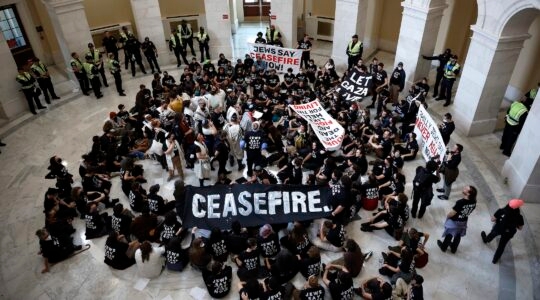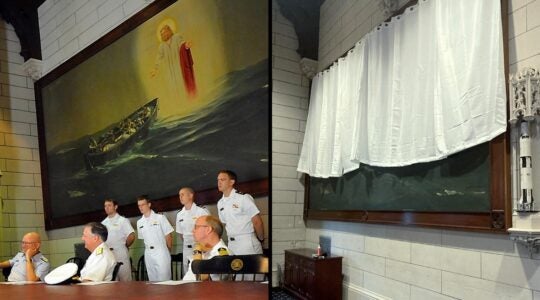With the recession taking a toll on donations, the Jewish Federation of Greater Washington brought in a legendary fundraiser for the UJA-Federation of New York to give some advice and provide his perspective on the economy in a talk for major donors. But, during his appearance Tuesday night, the former Bear Stearns chairman and CEO Alan “Ace” Greenberg also ended up having to spend a few minutes defending his own firm’s actions.
Asked why no one on Wall Street thought there was something wrong with the credit derivatives that many have blamed for the fall of investment banks like Bear Stearns (which was bought by J.P. Morgan Chase for just $2 a share last March), Greenberg said he was glad to get the opportunity to answer the question and responded: “When people say credit derivatives are the reason all this happened, they don’t know what they’re talking about.”
“It isn’t the reason we’re in in trouble,” continued Greenberg, comparing the complicated financial swaps to bets on football games. “Nobody on Wall Street thought there was something wrong with these derivatives.”
Bear Stearns “got in trouble for other reasons,” said the CEO of the bank from 1978-92 and chairman of the board from 1985-2001, who has joined J.P. Morgan Chase since the buyout as a vice chairman. “We were overextended and all of a sudden there was a run on the bank and we couldn’t sell quick enough to pay off everybody and we couldn’t go to the Fed and say help us out.”
“That’s America, that’s the way markets work,” said Greenberg, who became so animated in his response that he concluded with a chuckle and the comment “Later, I’ll tell you what I really think.”
Greenberg also said he believes “the model of the investment bank is gone forever" because a commercial bank which is victimized by a "run" will receive backing from the federal government, while an investment bank will fail. (He said he’s often asked whether the feds should have saved Lehman Brothers, and responds that he’s "not so sure they could" because, unlike Bear Stearns, no one was interested in buying it.)
In New York, Greenberg hosts an annual dinner at his private home for the federation’s largest donors, which raised $43 million this September — a $2 million increase from last year. But Greenberg noted Monday evening that the event was just a few days before the bottom dropped out of the market.
“The backbone of the campaign has been decimated” in New York, specifically pointing in a brief interview to the losses at hedge funds as a major obstacle for Jewish fund raising in his home city.
He suggested all fundraisers must take the present economic environment into account when soliciting gifits. “When you make a call, start off by saying, ‘We know what you did last year, whatever you can do for us we’ll appreciate it.’ There’s no sense in trying to badger someone — we all have to be considerate of what happened.”
“We have to continue to try to take care of people,” he said. “It’s just one of those things we have to do.”
The Washington D.C. federation
has already put $300,000 toward a "community assistance crisis fund" to meet safety net-type requests, such as providing loans to those about to lose their house or elderly who need food, and a projector on Monday evening flashed details of the increased community needs in the room before the speeches began. The organization
already has cut its internal budget, laying off eight staffers, implementing voluntary salary cuts for senior managers and limiting spending for events, food and travel, among other actions. (Indeed, the sushi and carved meats for the 50 people at Monday’s event could be classified as heavy hors d’oeuvres, differing from the full buffet dinners such federation events have featured in the past.)
Federation president Susie Gelman said that the organization had been hearing that some donors “can’t make a pledge right now” for the 2009 campaign – which runs through the next spring – while “others may not be able to fullfill their commitment to the 2008 campaign before the end of the year.”
“We’re in uncharted waters,” said the federation’s vice preident for campaign, Stuart Kurlander. But, he added, “it’s going to be a long campaign."
* This item was corrected — it originally said the federation had put $600,000 into the "community assistance crisis fund." There are $600,000 in requests for the fund.
JTA has documented Jewish history in real-time for over a century. Keep our journalism strong by joining us in supporting independent, award-winning reporting.





